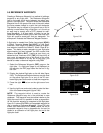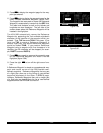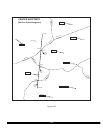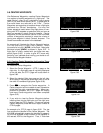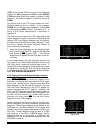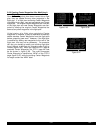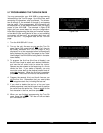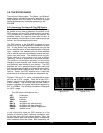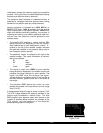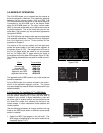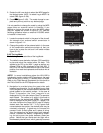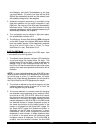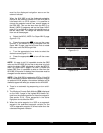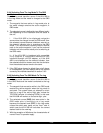
5-29
Rev 1
5.8 THE STATUS PAGES
There are four Status pages. The Status 1 and Status 2
pages display information pertaining specifically to the
GPS receiver while the Status 3 and Status 4 pages
display supplementary information pertaining to the
KLN 90B.
5.8.1 Determining The Status Of The GPS Signals
The Status 1 (STA 1) and Status 2 (STA 2) pages may
be viewed at any time to determine the status of the
GPS receiver and the GPS satellites being received.
This includes which satellites are being tracked, the
satellites’ health, the signal-to-noise ratio for each of
these satellites, the elevation of each satellite above the
horizon, and the estimated position error.
The GPS receiver in the KLN 90B is capable of using
signals from up to eight satellites to determine its posi-
tion. A valid position may be determined using as few
as four satellites alone or three satellites with an altitude
input. However, four satellites alone or three satellites
with an altitude input do not necessarily ensure that nav-
igation can take place. The satellites must be posi-
tioned relative to your location such that sufficient
“geometry” exists to determine an accurate position.
The satellite constellation geometry is continually
changing as each satellite rises, travels across the sky,
and eventually sets relative to your position. The GPS
satellites are not in geosynchronous orbits positioned
over the same spot on earth at all times like some televi-
sion communication satellites with which you may be
familiar. Rather, the GPS satellites are in orbits that
allow them to circle the earth about two times each day.
Figures 5-100 and 5-101 show a representative exam-
ple of a set of STA 1 pages. There will be two STA 1
pages if more than four satellites are being received as
in this example. The fact that there are two Status 1
pages is indicated in the page identification segment by
the “+” in STA+1. The following information is displayed
on a STA 1 page.
The GPS state is indicated on line 1:
INIT initialization
ACQ acquisition
TRAN transition
NAV navigation
NAV A navigation with altitude aiding
NAV D navigation with data collection
DEGRD navigation with position degradation
FAILR receiver failure
In the initialization state the GPS receiver is in the
process of initializing itself, collecting information such
as the date, time, and last present position. Next, the
receiver collects data from its own memory to determine
which satellites should be visible. After completing the
Figure 5-100
STATE NAV|
SV SNR ELE|
02 40 11^|
11 42 47^|
16 36 06^|
*18B 33 65^|
STA[1
Figure 5-101
19 46 59^|
28 45 43^|
|
|
|
|
STA[1



